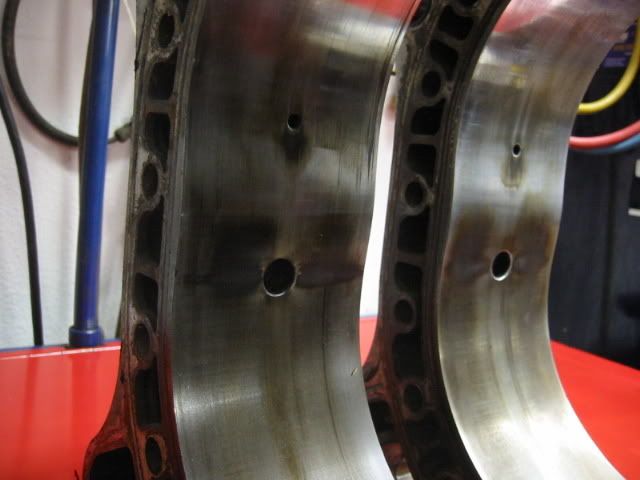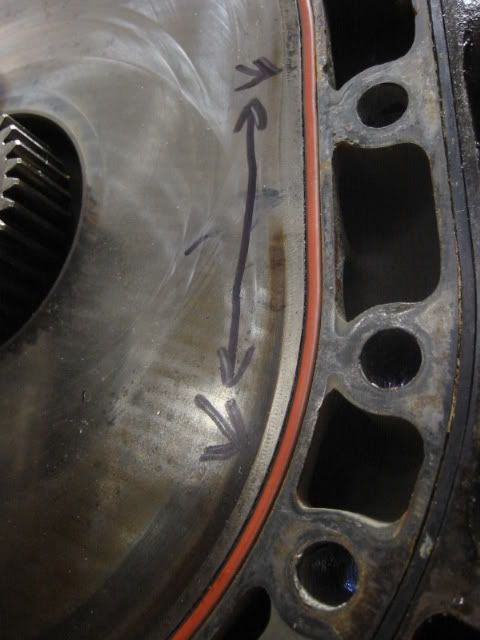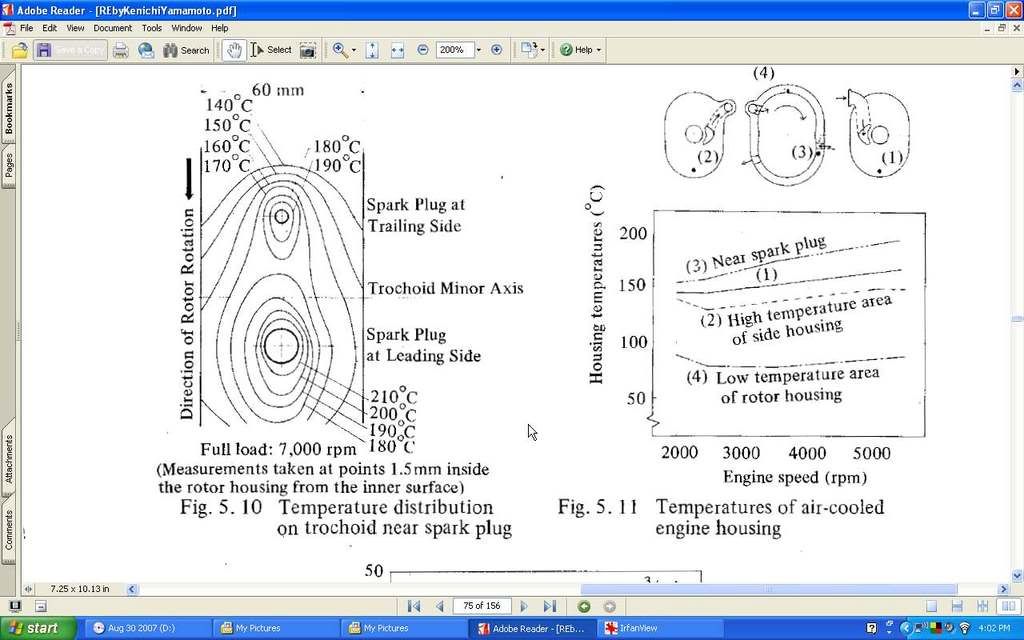|
|||||||
| Rotary Tech - General Rotary Engine related tech section.. Tech section for general Rotary Engine... This includes, building 12As, 13Bs, 20Bs, Renesis, etc... |
 |
|
|
Thread Tools | Display Modes |
|
|||||||
| Rotary Tech - General Rotary Engine related tech section.. Tech section for general Rotary Engine... This includes, building 12As, 13Bs, 20Bs, Renesis, etc... |
 |
|
|
Thread Tools | Display Modes |
|
|
#1 |
|
Rotary Fanatic
Join Date: Feb 2008
Location: Slidell, LA
Posts: 191
Rep Power: 18  |
Cooling System Mods
Some thoughts on improving the cooling of the rotor housing in the area of the spark plugs to minimize heat distortion.
Let’s go back to my previous engine failure. Whenever an engine is disassembled I do a failure analysis (an old habit of mine from working on helicopter turbine engines for a large oil company) and attempt to determine the Root Cause. Sounds so simple but like they say,” the devil is in the details”. So first we have the broken apex seal. The very common type failure with the apex seal chip imbedded in the rear rotor and it gouging the housing. Next we have the cracks at the spark plug holes and lifting of the apex seals in that area.  Add to that chafing of the side plates to rotor housing interface that same spark plug area.  At this point we have two contingents drawing different conclusions. One thinks we should secure the area better with dowels and or studs. The other group thinks better cooling of the area is appropriate. I started looking for 3 studs to reinforce that area. In my search for studs and reamers I contacted Carlos Lopez. He changed my direction. Carlos thought that creep was a symptom but not the root cause. The problem was high heat and low water flow in that area. He mentioned that the 3rd gen pump was one of the poorest designs. Kenichi Yamamoto's book shows the temps around the plug area.  My thoughts then went to 1-A better water pump (Mazmart) and, 2- Porting the rotor housing in the hot spots as shown above. Barry Last edited by Barry Bordes; 05-02-2008 at 06:59 AM. Reason: spelling |
|
|

|
|
|
#2 |
|
Sigh.....
Join Date: Feb 2008
Location: Murfreesboro, TN
Posts: 2,377
Rep Power: 20  |
This heat problem also leads to cracks around the spark plugs when someone takes the revs too high on a cold engine. Just a side note...

__________________
1986 Sport: 132k miles, 5A (Sapphire Blue Metallic), Tokico Blues, Racing Beat Springs, Custom LED tailights (only S4 LED tails in the world), SSR Mark II, Racing Beat exhaust, S5 black interior, Rotary Resurrection rebuild at 120k miles Community Service Manual RotorWiki "Imagination costs nothing; we could build square locomotives or fly to Mars" - Felix Wankel Yesterday is history, tomorrow is a mystery, but today is a gift. That is why it is called the "present." |
|
|

|
|
|
#3 | |
|
FUCK the fucking fuckers
Join Date: Mar 2008
Location: THE only Bay Area, Northern California
Posts: 3,172
Rep Power: 21  |
^^very good point BUT Mazda improved on the old rotary designs to minimize this damage in the newer (80's+) rotaries. It IS still possible though.
How would you "port" the housing to improve on the hot spots? I am not able to visualize the modification.
__________________
Quote:
 |
|
|
|

|
|
|
#4 |
|
Rotary Fan in Training
Join Date: Feb 2008
Location: On the Beach
Posts: 59
Rep Power: 18  |
Basically you make grooves in the water jacket area around the spark plugs to increase surface area for water to get to.
__________________
New rat from the sinking ship. |
|
|

|
|
|
#5 | |
|
FUCK the fucking fuckers
Join Date: Mar 2008
Location: THE only Bay Area, Northern California
Posts: 3,172
Rep Power: 21  |
sounds reasonable, is this common practice (i haven't advanced to internal work so I dunno)?
__________________
Quote:
 |
|
|
|

|
|
|
#6 | |
|
FUCK the fucking fuckers
Join Date: Mar 2008
Location: THE only Bay Area, Northern California
Posts: 3,172
Rep Power: 21  |
"Another problem Toyo Kogyo experienced that had been seen at NSU was the formation of cracks in the rotor housing around the sparkplug holes. It was determined that they were a result of "thermal shock" or sudden thermal loads placed on the housing when it was taken from a relatively cool temperature and sharply accelerated to 7,000rpm in all gears on a road test. By developing a test bed procedure that could consistently reproduce these conditions, engineers could then do systematic studies on cooling system improvements and their effect at relieving thermal loads. Tests were showing that on cars driven hard immediately after startup, the temperature of the inner wall of the rotor housing reached 450*F within one minute of startup. This abuse consistently produced cracks in the housing around the sparkplug opening after 4000 cycles.
Improvements in the cooling system brought the maximum temperatures of the rotor housing trochodial wall to below 410*F. But the final improvement was the redesign of the housing itself. The bosses for the tension bolts which held the engine together were relieved from the inner wall of the housing, thereby relieving part of the mechanical restrictions on the part that gets the hottest. Repeated testing after this improvement produced no more cracks in the housing." So this was back in the 70s. They've made the improvements on the engine since then to further reduce this problem. You lost an apex seal in the rear housing and I'm under the impression that the rear rotors tend to blow due to heat/preignition (cooling problems you're addressing) but it sounds like you may have also over-boosted and caused the sidehousing damage?  Are you monitoring exhaust temps? Are you going to do the cooling mod and the pump at the same time of will you try the pump first and see if the damage occurs again? How did you lose the motor (under boost/load)? What are your mods? Do you have close up pics of the sparkplug holes? It's cool that you're documenting and finding things like this. Thanks.
__________________
Quote:
 Last edited by Phoenix7; 05-02-2008 at 12:17 AM. |
|
|
|

|
|
|
#7 |
|
Rotary Fanatic
Join Date: Feb 2008
Location: AL
Posts: 379
Rep Power: 18  |
From what I've seen of water jacket ports they are essentially tiers, to increase the surface area, thereby increasing the heat-sinking capabilities.
__________________
1993 BB RX-7 2005 Black Mazda 6i 1991 Primer Celica GT 1968 Camo Chevy P/U Garfinkle's Airpump Idler Pulley: Keep the stock contact patch on your water pump w/o running Airpump! |
|
|

|
|
|
#8 |
|
Sigh.....
Join Date: Feb 2008
Location: Murfreesboro, TN
Posts: 2,377
Rep Power: 20  |
Is there any documentation on that? Regardless, it likely still a sizable issue. This is why I get annoyed when people do cold burnouts and stuff. They're just asking for screwed up housings...
__________________
1986 Sport: 132k miles, 5A (Sapphire Blue Metallic), Tokico Blues, Racing Beat Springs, Custom LED tailights (only S4 LED tails in the world), SSR Mark II, Racing Beat exhaust, S5 black interior, Rotary Resurrection rebuild at 120k miles Community Service Manual RotorWiki "Imagination costs nothing; we could build square locomotives or fly to Mars" - Felix Wankel Yesterday is history, tomorrow is a mystery, but today is a gift. That is why it is called the "present." |
|
|

|
|
|
#9 | ||
|
Rotary Fanatic
Join Date: Feb 2008
Location: Slidell, LA
Posts: 191
Rep Power: 18  |
Quote:
Quote:

|
||
|
|

|
|
|
#10 |
|
Rotary Fanatic
Join Date: Feb 2008
Location: Slidell, LA
Posts: 191
Rep Power: 18  |
The stock 3rd gen water pump with its square leading edges causes cavitation. Notice the damage is at the leading edge area of the housing.
 An early attempt at getting the stock pump to not cavitate by contouring the leading edge. 
|
|
|

|
|
|
#11 | |
|
Rotary Fanatic
Join Date: Feb 2008
Location: Slidell, LA
Posts: 191
Rep Power: 18  |
Quote:
Barry |
|
|
|

|
|
|
#12 | |
|
Rotary Fanatic
Join Date: Feb 2008
Location: Slidell, LA
Posts: 191
Rep Power: 18  |
Quote:
Very Interesting, Barry |
|
|
|

|
|
|
#13 |
|
Rotary Fanatic
Join Date: Feb 2008
Location: Slidell, LA
Posts: 191
Rep Power: 18  |
I actually did two housing mods. The first was to enlarge the passages in the hottest areas next to the sparkplugs as shown in Yamamoto's housing temp diagram.
But use caution! I cut through on the lower side of the Trailing plug. A bad combination of new carbide burs and being too large. 1/4" long shaft would probably be best. 
|
|
|

|
|
|
#14 | |||
|
FUCK the fucking fuckers
Join Date: Mar 2008
Location: THE only Bay Area, Northern California
Posts: 3,172
Rep Power: 21  |
Quote:
Quote:
__________________
Quote:
 |
|||
|
|

|
|
|
#15 | |
|
FUCK the fucking fuckers
Join Date: Mar 2008
Location: THE only Bay Area, Northern California
Posts: 3,172
Rep Power: 21  |
so the info about the cooling is cited from:
"Toyo Kogyo's Research and Development on Major Rotary Engine Problems" SAE transactions. Paper #700079 for SAE meeting of January 1970.
__________________
Quote:
 |
|
|
|

|
 |
| Bookmarks |
|
|